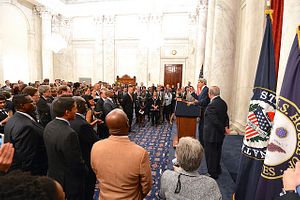The United States is not the first country to host more than fifty heads of African countries at one time. China welcomed African leaders to Beijing in 2000 for the inaugural Forum on China-Africa Cooperation (FOCAC), and has since held five additional FOCAC summits. This week, the U.S.-Africa Leaders Summit in Washington marks the first time a sitting president has invited all the leaders of Africa to a single event to discuss regional issues and the macro U.S.-Africa relationship. Lingering behind the headlines of this week’s summit, however, are the already deeply rooted relationships China has established with African states, and the impact China’s presence will have upon American-led initiatives on the continent. The United States has a long way to go in its treatment of Africa as a strategic continent, and this week’s summit is but a belated beginning.
Compared to the spectacle that FOCAC summits have become, the U.S.-Africa Leaders Summit seems muted. With sustainable economic growth and development as priority, events around Washington include the African Growth and Opportunity Act (AGOA) Forum, the U.S.-Africa Business Forum, and summit leader meetings between African leaders and President Obama. There will be no shortage of agreements produced, either: U.S. President Barack Obama has already announced $14 billion in commitments by U.S. companies for investments in Africa’s construction, manufacturing, energy, finance, and technology sectors. While these commitments should not be understated, they pale in comparison to Beijing’s estimated – and unrecorded – $75 billion in aid projects from 2000 to 2011.
The U.S.-Africa Leaders Summit, intended to “signal that [the U.S.] is elevating our engagement with Africa,” is also a not-so-subtle attempt to catch up with Chinese inroads on the continent. The United States lags behind China in its ability to effectively use strategic investments in Africa as tools for developing relationships of geopolitical importance, a diplomatic toolkit Beijing has readily employed across the continent. China’s trade with Africa rose to $200 billion in 2013 – largely Beijing’s imports of natural resources and exports of electronics and textiles – more than double U.S.-Africa trade levels. Foreign direct investment (FDI) inflows from Beijing have also increased six-fold since 2005, to $2.5 billion in 2012. Development assistance in the form of interest-free loans, grants, and concessional loans totals $14.41 billion between 2010 and 2012 alone. These strategic investments, whether in Algeria or Zambia, ultimately guarantee China’s safe and continued access to African natural resources and domestic markets. But unlike China, the United States is more focused upon deepening trade and investment relationships and bolstering the rule of law, rather than access to markets and natural resources.
Chinese investments help create jobs, develop much needed infrastructure, and contribute to economic growth, particularly in areas where the West is unwilling to engage. But for all the positive side effects, China’s strategic investments are often poor quality, aimed at short-term gains of keeping nondemocratic regimes in power, particularly those that are unfriendly to the United States. Even if U.S. investments in Africa are unable to match the scope of their Chinese counterparts, what distinguishes the American presence in Africa is Washington’s ability to assist on security issues. Yes, China may attempt to bolster African security through continued weapons sales, but no time soon will Beijing possess the know-how to advise on countering extremist groups like Boko Haram, al-Shabaab, and al-Qaeda, or on combatting human rights abuses. Washington’s support will still matter more.
Thus, what remains to be discussed – both this week at the U.S.-Africa Leaders Summit and beyond – is whether there is room for U.S.-China cooperation in Africa. Cooperation on economic development, shared security challenges, and regional integration would ameliorate any latent turf wars, extinguishing the rationale of the U.S. simply trying to “catch up” with China in Africa. A recent RAND report on Chinese engagement in Africa further suggests that Washington and Beijing should rejuvenate the U.S.-China Subdialogue on Africa to discuss, and ultimately generate, concrete cooperative initiatives. Small-scale cooperation on even the most minute of shared interests in Africa would be progress, not competition.
As the U.S.-Africa Leaders Summit wraps up, the current administration should use the investment deals, high-level meetings, and reinvigorated camaraderie as an opportunity to further boost momentum in Washington’s macro relationship with African countries. Bolstering geostrategic relationships through the use of trade and investment as well as aiding African countries with internal security issues is of the utmost importance. The Obama administration’s invitation to African leaders to attend the first U.S.-Africa Leaders Summit was better late than not at all. With China’s decade-long head start in mind, much ground remains to be covered by the United States in encouraging Africa’s growth and trade. This week is but only the beginning.
Lauren Dickey is a research associate in U.S. foreign policy at the Council on Foreign Relations in Washington, D.C.

































